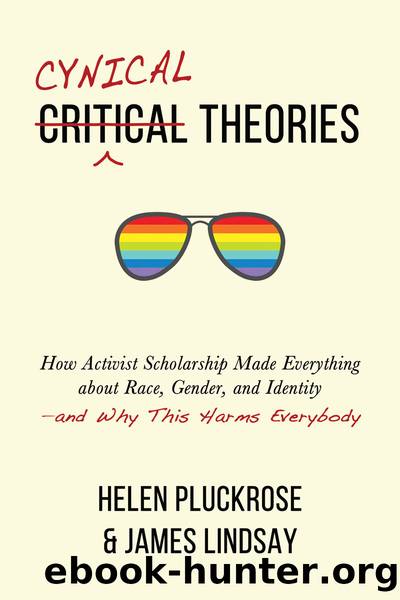Cynical Theories by Helen Pluckrose;James A. Lindsay;

Author:Helen Pluckrose;James A. Lindsay;
Language: eng
Format: epub
Publisher: Independent Publishers Group
Published: 2020-07-15T00:00:00+00:00
THEORY—A PARANOID FANTASY
In order to navigate this complex grid of power-laden discourses, one has to first be trained to detect it. This is what critical Theory was invented to do. So, in a circular, self-justifying argument, Theory insists that we need Theory. For some fat studies scholars, gender—thus intersectional feminism and queer Theory—is most significant:
Sexism has become a deeply coded set of behaviors that are difficult to unlock if you don’t know how to see them. It can take special access to education and language in order to unveil sexist behavior. Often, that critical language is cast as suspect, overly intellectual, or a product of paranoid fantasy.44
For others, although the intersectional and queer approach to evaluation and disruption is both productive and appropriate, everything ultimately comes back to capitalism. Charlotte Cooper, for instance, makes a very similar argument to that made by Goodley in Disability Studies. For Cooper, the forces of “neoliberalism” (approximately: capitalist society) pressure people to adapt themselves to society, instead of requiring society to accommodate them. Cooper is therefore deeply critical of the body positivity movement, which she considers a form of “gentrification” in its “emphasis on individualism rather than collectivity.”45 Her issue is that body positivity places the responsibility on individuals to love their own bodies and be happy in them, rather than on society to stop viewing obesity negatively—a problematic approach, which is sometimes referred to as responsibilizing them. As one member, “Liz,” of what Cooper called her “fat community,” who she interviewed for Fat Activism, argues, “Fat hatred is fuelled by capitalism because these companies create products that are all about making fat people skinny,”46 and “using capitalism as a basis for activism illustrates how, within the gentrification of fat activism it is access rather than social transformation that has become the main motivator.”47
If this sounds like a paranoid fantasy, it’s because it is. The idea of an intersectional power grid surrounding fat activism is needlessly messy. Biology and the science of nutrition are misunderstood as a form of Foucauldian “biopower,” which constrains and disciplines people. Medical science around obesity is misunderstood to impose an oppressive, disciplinary narrative on people. “[C]alling fat people ‘obese’ medicalizes human diversity”48 and “Medicalizing diversity inspires a misplaced search for a ‘cure’ for naturally occurring difference,”49 Marilyn Wann tells us in the foreword to the Fat Studies Reader, echoing Foucault. Kathleen LeBesco likens obesity to homosexuality and reasons that, just as homosexuality has now been recognized as a naturally occurring phenomenon that does not need a cure, so too must obesity be similarly recognized. Despite the ample evidence that obesity increases the risk of serious diseases and early death, while homosexuality in itself does not, LeBesco also speculates that obese people who think their weight is a problem have been conditioned into accepting their oppression:
That fat and queer people would heartily embrace science and medicine as a solution to their socially constructed problems is redolent of Stockholm syndrome—after all, science and medicine have long been instrumental in oppressing fat
Download
This site does not store any files on its server. We only index and link to content provided by other sites. Please contact the content providers to delete copyright contents if any and email us, we'll remove relevant links or contents immediately.
The Art of Coaching Workbook by Elena Aguilar(50099)
Trainspotting by Irvine Welsh(21010)
Twilight of the Idols With the Antichrist and Ecce Homo by Friedrich Nietzsche(18296)
Fangirl by Rainbow Rowell(8783)
Periodization Training for Sports by Tudor Bompa(7914)
Change Your Questions, Change Your Life by Marilee Adams(7367)
This Is How You Lose Her by Junot Diaz(6430)
Asking the Right Questions: A Guide to Critical Thinking by M. Neil Browne & Stuart M. Keeley(5353)
Grit by Angela Duckworth(5294)
Red Sparrow by Jason Matthews(5191)
Paper Towns by Green John(4785)
Room 212 by Kate Stewart(4730)
Ken Follett - World without end by Ken Follett(4441)
The Sports Rules Book by Human Kinetics(4072)
Housekeeping by Marilynne Robinson(4057)
Double Down (Diary of a Wimpy Kid Book 11) by Jeff Kinney(3921)
Papillon (English) by Henri Charrière(3898)
Exercise Technique Manual for Resistance Training by National Strength & Conditioning Association(3784)
The Motorcycle Diaries by Ernesto Che Guevara(3778)
